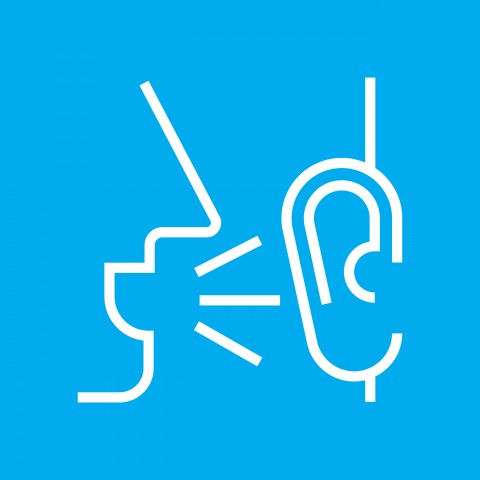
If there’s one thing Israelis like to do, it’s talk! We’re called the People of the Book, but it would be just as legitimate to call us the People of the Word, as Jews like language any way we can get it, whether written, spoken, or even sung. Of course, regardless of the culture in question, mastering the art of conversation is a key part of acquiring a new language. But how can one actually go about improving one’s Hebrew conversation skills? And what are the relevant skills that make for good conversation in the first place?
Well, these questions are just what today’s lesson is going to address. Together, we’ll look at both general ways to improve your ability to converse in Hebrew and specific language to focus on for your own personalized linguistic profile. We’ll examine common conversation starters, questions and answers, and even filler words. Finally, we’ll have a look at some basic tips you can use to boost your conversation game.
As we look at these various aspects of Hebrew conversation, along with brief sample conversations as a reference, remember that your Hebrew speaking skills are yours. This means that part of mastering any language is learning how to use it in order to express the person you already are. While it’s definitely necessary to make some linguistic and cultural adjustments to be able to use Hebrew effectively, we hope this lesson will also empower you to really find your own unique voice, even as you translate it into another tongue.
Without further ado, let’s delve into HebrewPod101’s Ultimate Guide to Improving Your Hebrew Conversation Skills.

 Table of Contents
Table of Contents
- Make Your Own Language Profile
- Learn Hebrew Reactions
- Learn Hebrew Filler Words
- Learn Common Questions and Answers in Hebrew
- Learn Conversation Starters
- General Tips to Help Improve Your Hebrew Conversation
- How HebrewPod101 Can Help You Improve Your Conversation Skills
1. Make Your Own Language Profile

As we mentioned in the introduction, part of mastering the art of conversation in a foreign language is identifying the language chunks you need to talk about yourself and the things you’re interested in. This notion should be fairly self-explanatory. So many conversations entail talking and answering questions about ourselves that we want to be sure we show up ready to express who we are without hesitation.
While some people even go so far as to prepare a “cheat sheet” with some phrases to talk about themselves, we highly recommend that if you do so, you use it for memorization before you try the language out in a live conversation. Israel is a rather fast-paced society, so needing to pause and refer to a cheat sheet is unlikely to leave much of an impression. Rather, take your time and pick just a few phrases at a time to add to your repertoire, and you should have little to no trouble recalling them when the time comes.
Below are some helpful language elements we hope will get you on your way, along with some contextualized examples of how to use them. Be sure to look up the words you need to describe yourself, including your profession, place of origin, hobbies, etc.
1. שלום, אני…
Shalom, ani…
“Hi, I’m/my name is …”
2. אני מ…
Ani me….
“I’m from …”
3. אני בן / בת …
Ani ben / bat …
“I’m … years old.”
4. אני רווק/ה.
Ani ravak / revakah.
“I’m single.”
5. אני נשוי / נשואה.
Ani nasui / nesu’ah.
“I’m married.”
6. יש לי … ילדים.
Yesh li … yeladim.
“I have … kid(s).”
7. אני …
Ani …
“I’m a …”
8. אני עובד/ת ב…
Ani oved / ovedet be…
“I work in / at …”
9. אני לומד/לומדת … ב….
Ani lomed / lomedet … be/ba…
“I’m studying … at …”
10. אני אוהב / אוהבת …
Ani ohev / ohevet …
“I like/love …”
- שלום, שמי רמון. אני מקולומביה. אני בן 26. אני רווק. אני מהנדס ואני לומד הנדסה בטכניון. אני אוהב לרקוד סלסה.
Shalom, ani Ramon. Ani mi-Kolombia. Ani ben ‘esrim ve-shesh. Ani ravak. Ani lomed handasah ba-Tekhniyon. Ani ohev lirkod salsah.
“Hi, my name is Ramon. I’m from Colombia. I’m 26 years old. I’m single. I’m studying engineering at the Technion. I like salsa dancing.”
- שלום, שמי שירה. אני מקנדה. אני בת 37. אני נשואה. יש לי שני ילדים. אני אחות. אני עובדת בבי”ס תיכון. אני אוהבת לנגן בגיטרה וכינור.
Shalom, ani Shirah. Ani bat shloshim ve-sheva’. Ani nesu’ah. Yesh li shnei yeladim. Ani akhot. Ani ‘ovedet be-veit sefer tikhon. Ani ohevet lenagen be-gitarah ve-kinor.
“Hi, I’m Shira. I’m 37 years old. I’m married. I have two kids. I’m a nurse. I work at a high school. I like to play guitar and violin.”
2. Learn Hebrew Reactions

Apart from being able to convey basic personal information about ourselves, it’s always good to be prepared to respond to anything our conversation partner may throw our way. While there are almost an infinite number of responses you could offer in any given situation, we’ve curated the most common and most useful ones for you here.
Again, this list is nowhere near exhaustive, but we do think these represent reactions that work in a broad variety of situations. We’ve also provided a few examples of how to use them in context.
1. נהדר
Nehedar
“Great.”
- – שמעת שאנחנו נוסעים לקנדה בשבוע הבא לבקר את המשפחה שלי?
Shama’ta she-anakhnu nos’im le-Kanadah ba-shavu’a ha-ba levaker et ha-mishpakhah sheli?
“Did you hear that we’re going to Canada next week to visit my family?”
– נהדר! נסיעה טובה!
Nehedar! Nesi’ah tovah!
“Great! Have a great trip!”
- – אני חוגג יום-הולדת מחר ואתה מוזמן לבוא למסיבה.
Ani khogeg yom-huledet makhar ve-atah muzman lavo la-mesibah.
“It’s my birthday tomorrow, and you’re invited to come to the party.”
– נהדר! תודה רבה.
Nehedar! Todah rabah.
“Great! Thanks a lot.”
2. נכון מאוד.
Nakhon me’od.
“Very true.”
- – המסעדה הזאת ממש זולה!
Ha-mis’adah ha-zot mamash zolah!
“This restaurant is really affordable!”
– נכון מאוד.
Nakhon me’od.
“Very true.”
- – אני חושבת שמאז שהתחלפה הממשלה, המדינה משתפרת.
Ani khoshevet she-me’az she-hitkhalfa ha-memshalah, ha-medinah mishtaperet.
“I think that since the government has changed, the country has been improving.”
– נכון מאוד.
Nakhon me’od.
“Very true.”
3. אתה צודק / את צודקת.
Atah tzodek / At tzodeket.
“You’re right.”
- – סליחה, אבל חסר לי כאן עודף.
S’likhah, aval khaser li kan ‘odef.
“Sorry, but I’m missing some change here.”
– את צודקת. הנה.
At tzodeket. hine.
“You’re right. Here you go.”
- – אולי אני טועה, אבל נדמה לי שהחנייה כאן היא תת-קרקעית.
Ulai ani to’eh, aval nidmeh li she-ha-khanayah kan hi tat-karka’it.
“I may be wrong, but I think the parking here is underground.”
– אתה צודק. בוא נרד למטה.
Atah tzodek. Bo nered lemata.
“You’re right. Let’s head down.”
4. מעניין.
Me’anyen.
“Interesting.”
- – שמעת שיש כבר טיסות בין ישראל לאיחוד האמירויות?
Shama’t she-yesh kvar tisot bein Yisrae’il le-Ikhud ha-Amiruyot?
“Have you heard that there are already flights between Israel and the UAE?”
– מעניין. בא לי לנסוע.
Me’anyen. Ba li linso’a.
“Interesting. I’d like to go.”
- – למדתי סיף מאבא שלי, שבזמנו היה סייף אולימפי.
Lamadeti sa’if me-Abba sheli, she-be-zmano hayah sayyaf Olimpi.
“I learned fencing from my father, who used to be an Olympic fencer.”
– מעניין. לא ידעתי.
Me’anyen. Lo yada’ti.
“Interesting. I didn’t know that.”
5. מה אתה אומר / את אומרת?
Mah atah omer / Mah at omeret?
“You don’t say.”
- – אומרים שהמגפה התחילה עם עטלפים בסין.
Omrim she-ha-magefah hitkhilah im ’ataleifim be-Sin.
“They say the pandemic started with bats in China.”
– מה את אומרת? לא להאמין.
Mah at omeret? Loleha’amin.
“You don’t say. It’s hard to believe.”
- – אחות שלי מתכוננת למרתון בניו יורק כבר שנה וחצי.
Akhot sheli mitkonenet la-Maraton be-Nyu York kvar shanah va-khetzi.
“My sister has been training for the New York Marathon for a year and a half already.”
– מה אתה אומר? שיהיה לה בהצלחה!
Mah atah omer? She-yihiyeh la be-hatzlakhah!
“You don’t say. Good luck to her!”
3. Learn Hebrew Filler Words

Filler words, sometimes also known as crutch words, are a great way to show interest in a conversation without putting yourself on the spot to say more than you can handle. Alternatively, they can be a great way to buy a bit of time as you plan the next thing you’re going to say. Here are a few of the most common Hebrew filler words. You can find more here.
1. אממ…
Em
“Um”
- – אז מה בא לך לאכול?
Az mah bah lakh le’ekhol?
“So what do you feel like eating?”
– בא לי, אממ, שווארמה בלאפה.
Ba li, emm, shawarmah be-lafah.
“I feel like, um, shawarma in lafa bread.”
- – איך קוראים לזמרת הזאת?
Eikh korim la-zameret ha-zot?
“What’s this singer’s name?”
– אני חושב שזאת דואה, אממ, דואה ליפה.
Ani khoshev she-zot Du’ah, emm, Du’ah Lipah.
“I think that’s Dua, um, Dua Lipa.”
2. כאילו
Ke’ilu
“Like”
- – למה אתה לא אוהב לשתות קפה?
Lamah atah lo ohev lishtot kafeh?
“Why don’t you like drinking coffee?”
– לא יודע. זה כאילו ממריץ אותי יותר מדי.
Lo yode’a. Zeh ke’ilu mamritz oti yoteir midai.
“I dunno. It, like, gets me too worked up.”
- – מה אמרו לך בראיון?
Mah amru lakh ba-re’ayon?
“What did they tell you in the interview?”
– לא תאמיני אבל ביטלו אותו, כאילו, בלי להודיע לי!
Lo ta’amini aval bitlu oto, ke’ilu, beli lehodi’a li.
“You won’t believe it, but they cancelled it, like, without letting me know.”
3. יעני
Ya’ani
“I mean”
- – מה תרצה לאכול?
Mah tirzeh le’ekhol?
“What would you like to eat?”
– ארוחת בוקר קלאסית, יעני, ביצים, טוסט, גבינה.
Arukhat boker klasit, ya’ani, beitzim, tost, gvinah.
“Bring me a classic breakfast, I mean, eggs, toast, cheese.”
- – אני לא בטוחה שהבנתי את הכוונה שלך.
Ani lo betukhah she-hevanti et ha-kavanah shelkha.
“I’m not sure I understood what you meant.”
– אני עייף מכל העבודה, יעני, מותש.
Ani ‘ayeif mi-kol ha-’avodah, ya’ani, mutash.
“I’m tired from all the work, I mean, exhausted.”
4. בצעם
Be-’etzem
“Essentially / Basically”
- – מה זה הדבר הזה?
Mah zeh ha-davar ha-zeh?
“What is that thing?”
– זה בעצם רובוט שמנקה לך את הרצפה.
Zeh be-’etzem robot she-menakeh lekha et ha-ritzpah.
“It’s essentially a robot that cleans the floor for you.”
- – במה אתה עובד?
Be-mah atah ‘oved?
“What do you do for a living?”
– אני בעצם מתאם בין קונים ומוכרים של ציוד משרדי.
Ani be-etzem meta’em bein konim ve-mokhrim shel tziyud misradi.
“I basically broker between buyers and sellers of office equipment.”
5. אז
Az
“So”
- – אז… נוסעים לים?
Az… nos’im la-yam?
“So… should we go to the beach?”
– יאללה, בוא.
Yallah, bo.
“Let’s go.”
- – אני רואה שאתה מקבל את ההודעות שלי ולא עונה, אז…
Ani ro’ah she-atah mekabell et ha-hoda’ot sheli ve-lo ‘oneh, az…
“I see you’re getting my messages and not answering them, so…
– אז כלום. סתם לא ראיתי אותם.
Az klum. Stam lo ra’iti otam.
“So nothing. I just didn’t see them.”
4. Learn Common Questions and Answers in Hebrew

As you surely know, and as you can clearly see from our examples, so much of conversation revolves around questions and answers. While it would be impractical if not impossible to try to prepare oneself to answer any question, it’s fairly easy to identify the more common questions one is likely to find oneself fielding. This is especially true if one is a foreigner sojourning in a distant land!
With that in mind, here are the top questions, with some sample answers, that you’re likely to encounter as a foreigner in Israel. One you’ve got these down, try expanding on them by anticipating the sorts of follow-up questions you might get in a typical conversation, along with some good answers to offer. For example, if you tell someone that you’re working or studying in Israel, it’s reasonable to assume they may ask you how long you’ve been there. You can find more on questions and answers in Hebrew here.
1. מאיפה אתה / את?
Me-eifoh atah / at?
“Where are you from?”
(You can find a list of country names in Hebrew here.)
- אני מצרפת.
Ani mi-Tzarfat.
“I’m from France.
- אני מלונדון.
Ani mi-London.
“I’m from London.”
- אני ממקסיקו.
Ani mi-Meksiko.
“I’m from Mexico.”
- אני מרוסיה.
Ani mi-Rusiyah.
“I’m from Russia.”
2. מה שלומך?
Mah shlomkha / shlomekh?
“How are you?”
(You can find more possible responses here.)
- אני בסדר.
Ani beseder.
“I’m okay.”
- אני מעולה.
Ani me’uleh / me’ulah.
“I’m great.”
- אני על הפנים.
Ani ‘al ha-panim.
“I’m awful.”
3. איך למדת עברית?
Eikh lamadeta / lamadet ‘Ivrit?
“How did you learn Hebrew?”
- למדתי עברית בביה”ס.
Lamadeti ‘Ivrit be-veit ha-seifer.
“I learned Hebrew at school.”
- למדתי עברית באוניברסיטה.
Lamadeti ‘Ivrit ba-universitah.
“I learned Hebrew at university / in college.”
- למדתי עברית בבית.
Lamadeti ‘Ivrit ba-bayit.
“I learned Hebrew at home.”
- למדתי עברית לבד.
Lamadeti ‘Ivrit levad.
“I learned Hebrew on my own.”
4. למה אתה לומד / את לומדת עברית?
Lamah atah lomed / at lomedet ‘Ivrit?
“Why are you studying Hebrew?”
- אני לומד עברית מתוך ציונות.
Ani lomed ‘Ivrit mitokh Tziyonut.
“I’m studying Hebrew out of Zionism.”
- אני לומד עברית בשביל הלימודים / לעשות עסקים.
Ani lomeid ‘Ivrit bishvil ha-limudim / la’asot le-’asakim.
“I’m studying Hebrew for school / business.”
- אני לומדת עברית כי יש לי הרבה חברים ישראלים.
Ani lomedet ‘Ivrit ki yesh li harbeh khaverim Yisra’elim.
“I’m studying Hebrew because I have a lot of Israeli friends.”
- אני לומדת עברית בגלל שבעלי ישראלי.
Ani lomedet ‘Ivrit biglal she-ba’ali Yisra’eli.
“I’m studying Hebrew because my husband is Israeli.”
- אני לומד עברית כדי לקרוא את התנ”ך בשפת המקור.
Ani lomed ‘Ivrit kedei likro et ha-TaNa”Kh bi-sfat ha-makor.
“I’m studying Hebrew in order to read the Bible in the original language.”
5. מה אתה / את עושה בארץ?
Mah ata oseh / at osah ba-Aretz?
“What are you doing in Israel?”
- אני לומד/ת.
Ani lomed / lomedet.
“I’m studying.”
- אני עובד/ת.
Ani ‘oved / ‘ovedet.
“I’m working.”
- אני מטייל/ת.
Ani metayel / metayelet.
“I’m traveling.”
- אני מבקר/ת אצל משפחה / חברים.
Ani mevaker / mevakeret etzel mishpakhah / khaverim.
“I’m visiting family / friends.”
- אני סופג/ת קצת תרבות.
Ani sofeg / sofeget k’tzat tarbut.
“I’m soaking up some culture.”
5. Learn Conversation Starters

Sometimes the hardest part of a conversation is getting one started. The truth is that while this can be universally true, it’s doubly so when the language you wish to converse in isn’t your native one. With that in mind, here are some tried and true ways you can start up a conversation in different situations.
Keep in mind that not all of these will work all the time. For example, asking two passengers on a bus sitting next to one another how they met may not yield the best results. But if you meet the girl of your dreams at a party moments before her boyfriend sidles up, the same question might just help you save face! So use these judiciously.
1. איך הכרתם? / איך אתם מכירים?
Eikh hikartem? / Eikh atem makirim?
“How did you meet? / How do you know each other?”
2. מה אתה אוכל/שותה / את אוכלת/שותה?
Mah atah okhel/shoteh? / Mah at okhelet/shotah?
“What are you eating/drinking?”
3. כמה זמן לקח לך להגיע?
Kamah zman lakakh lekha/lakh lehagi’a?
“How long did it take you to get here?”
4. במה אתה עובד / את עובדת?
Be-mah atah oved / at ovedet?
“What do you do for a living?”
5. בא לך משהו לאכול/לשתות?
Ba lekha/lakh mashehu le’ekhol/lishtot?
“Would you like something to eat/drink?”
6. אתה בא / את באה לכאן הרבה?
Atah ba / At ba’ah le-khan harbeh?
“Do you come here a lot?”
7. את/ה יודע/ת מה השעה?
At/ah yoda’at/yode’a ma ha-sha’ah?
“Do you have the time?”
8. איזה מזג אוויר, אה?
Eizeh mezeg avir, ah?
“Some weather, huh?”
9. אני מכיר/ה אותך מאיפשהו?
Ani mekir / mekirah otkha / otakh mi-eifohshehu?
“Do I know you from somewhere?”
10. מישהו יושב כאן?
Mishehu yoshev kan?
“Is anyone sitting here?”
6. General Tips to Help Improve Your Hebrew Conversation
Lastly, here are a handful of choice tips to help you take your conversation game to the next level. Alongside studying the relevant language, these tips can set you up for success as you become the great Hebrew conversationalist you were surely meant to be. And we here at HebrewPod101 know you’ve got it in you! As a bonus, these tips can also help you improve your conversation in English and/or any other language you speak, assuming the linguistic culture isn’t drastically different (for instance, if eye contact is considered offensive).
That having been said, just as with any other art, the key to mastering the art of conversation lies in the hours you spend practicing. But the good news is that, as long as your conversation partner has something interesting to share – and who doesn’t? – conversation is not just an art but a very enjoyable pastime, as well! So go on and have some fun!
1. Active listening and mirroring

Active listening means you are fully engaged in the conversation. You can show this by mirroring the other person’s language and non-verbal gestures, as well as by responding at regular intervals to keep the conversation flowing. Note that this is where filler words can really come in handy. Whatever you do, try to avoid those awkward silences, as they are just as awkward in Hebrew as they are in English!
2. Demonstrate understanding and empathy

No one enjoys speaking to someone who seems to just be waiting for every opportunity to turn the focus back to him- or herself. Not only is this rude, but it also turns a conversation into a monologue. Really listen to the other person, and show them that you are listening by reacting directly to things they’ve said, asking follow-up questions, and referring back to things mentioned previously in the conversation. In short, show that you actually care about what they’re telling you!
3. Focus on using the right gender

This one is obviously less relevant to non-gendered languages like English, but it’s key in Hebrew’s case. Gender may be a bit stressful to have to keep in mind, particularly if you are new to grammatically gendered languages. But think about how uncomfortable it is when people are referred to in a gender they don’t identify with, and you’ll quickly comprehend why it behooves you to pay attention to this. Remember that Hebrew genders are not just nouns and pronouns but also adjectives and verbs.
4. Invest in your pronunciation

Practice the sounds of the Hebrew language, which you can find more on here. There are a number of sounds in Hebrew that will be foreign to English speakers in particular, and you may never really nail them perfectly. However, you can always approximate, and close is much better than making no effort at all! Trust us when we tell you that Israelis are both aware of the challenges Hebrew poses for non-native speakers and appreciative when non-native speakers make a conscious effort to improve their pronunciation.
5. Avoid over reliance on filler words

Remember when we said that filler words are also sometimes called crutches? This is true in cases of overreliance on them, and that’s something you want to avoid. We’ve all met that person who uses a particular word or phrase, often “like” or “you know,” and we all know just how tiring that can become. Overusing such words, which don’t typically convey any meaning, does not make a good impression, as it suggests a scattered focus or even a lack of something to say. So yes, use fillers, but, emm, in moderation!
6. Ask for words if you don’t know them

While in some cultures, people may be reluctant to admit when they don’t know something, it’s highly unlikely that any Israeli is going to look down on you if you admit to not knowing the right word for what you want to say. On the contrary, most will be happy to have the opportunity to help you! Remember that Israel is a country of immigrants, so all Israelis are experienced in speaking to foreigners, no matter how rough, or even non-existent their Hebrew may be. By asking an Israeli for the right Hebrew word for what you want to say, you will more likely than not impress them with your commitment to precision and your desire to learn.
7. Smile!
Okay, maybe not all the time. After all, sometimes the bus doesn’t even stop for you, or the babushka lady runs over your foot with her cart as you’re trying to get on board, so a frown is sometimes warranted. But a smile can go a long way in conveying what you may not yet be able to say in Hebrew. In any case, it’s a universal sign that means you’re happy to be talking to your conversation partner, so why not just flash one and see what happens?
7. How HebrewPod101 Can Help You Improve Your Conversation Skills
Last but not least, HebrewPod101 offers you a wide variety of tools and other resources to help you boost your powers of gab. Aside from our many blogs on all things Hebrew, you can also listen to many sample conversations where you can experience what Hebrew words, phrases, and grammar points in context and with native pronunciation. Additionally, you can take advantage of HebrewPod101’s vocabulary lists that can arm you with a more robust lexicon for a given topic or situation.
And if you really want to take your Hebrew conversation skills to the next level, you can also avail yourself of a personal teacher through our Premium PLUS offer. We at HebrewPod101 are here to help! Our expert and native teachers would love to hear from you with any questions or comments you may have, so don’t hesitate to reach out. Until next time, shalom!










